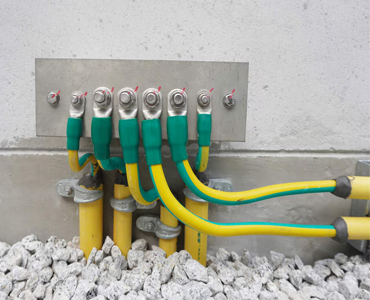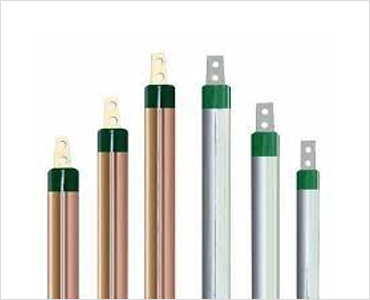We Provide Best Electrical Service.
Chemical Earthing
Chemical Earthing
Chemical earthing, also known as chemical ground electrode, is a method used to create a low-resistance electrical connection to the ground. It's commonly employed in electrical systems, particularly in places where the soil conductivity is poor.
Chemical earthing, also known as chemical grounding or chemical electrode earthing, is a method of creating an efficient grounding system for electrical installations.


Chemical Earthing:
Here's how it works and its applications:
- Grounding Purpose: The primary purpose of chemical earthing is to provide a low resistance path to the ground for fault currents in electrical systems. This ensures the safety of equipment and personnel by preventing electric shocks and damage to electrical appliances.
- Installation: During installation, a pit is dug in the ground, and the electrode is placed vertically in the pit. The electrode is connected to the electrical system, and the pit is then filled with the conductive compound. This compound enhances the conductivity of the soil around the electrode, ensuring a stable and low-resistance connection to the ground.
Working of Chemical Earthing:
Electrical services offer numerous advantages, especially in modern society where electricity plays a critical role in almost every aspect of our lives. Here are some key advantages:A metal rod or plate, usually made of copper or galvanized iron, is driven into the ground. The area surrounding the electrode is filled with a conductive compound, typically a mixture of various minerals and salts, which enhances the conductivity of the soil around the electrode. Over time, an electrolytic process occurs between the metal electrode and the surrounding soil. This process forms a low-resistance path for the dissipation of fault currents or electrical surges into the earth.
Advantages of Chemical Earthing:
- Low Resistance: By enhancing the conductivity of the soil around the electrode, it provides a low-resistance path to the ground, ensuring effective dissipation of fault currents.
- Durability: Chemical earthing systems are often durable and require minimal maintenance once installed.
- Consistency: Unlike traditional earthing methods, such as rod or plate earthing, chemical earthing tends to offer more consistent performance regardless of variations in soil conditions.
- Space Efficiency: Chemical earthing systems typically require less space compared to traditional methods, making them suitable for areas with limited space availability.
However, it's essential to ensure that the chemicals used in the backfill material are environmentally safe and do not pose any risk to the surrounding soil or groundwater. Additionally, proper installation by qualified professionals is crucial to ensure the effectiveness and safety of the chemical earthing system.
